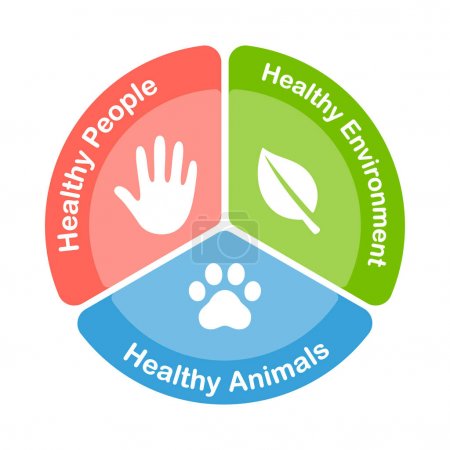Public health and ecosystem function reveal the intrinsic connections between human and wildlife health.
Currently, societies are facing challenges that are especially pressing in cities. The One Health concept promotes the health and well-being of urban communities and ecosystems. However, for this concept to be effective, it must incorporate social inequities in environmental pollution, exposure and policies.
Intensifying social, political and environmental unrest highlights the need for solutions based on environmental justice principles to help build healthier and more resilient cities.
Urbanisation creates opportunities and challenges for the well-being of people and nature. Over two-thirds of the world’s population is projected to live in urban areas by 2050 (UN Dep. Econ. Soc. Aff. 2018); thus, cities are considered complex social-ecological systems characterised by high human densities and infrastructure to support their communities. However, industrial activity can lead to elevated levels of chemical pollutants, noise, light, heat and disruption of the resources available, which can create complex challenges for human health and the health of the ecosystems, not to mention the generation of new reservoirs for pathogens. This is why mitigating these challenges is imperative to protecting human, wildlife and ecosystem health as urbanisation accelerates globally.
Hence, modern environmental challenges and health concerns require a holistic, systems-level approach that recognises the interdependence of human, animal and environmental health, a paradigm known as “One Health” (Cunningham et al. 2017, Daszak et al. 2000, Lebov et al. 2017). This approach also acknowledges the frequency, risks and benefits of human-wildlife-environment interactions that vary across urban communities in terms of race and social class.
Therefore, any health framework that does not incorporate or acknowledge environmental racism and social inequality is incomplete (Lysaght et al. 2017), which is the reason why interdisciplinary collaborative bridges must be built between One Health and environmental justice discourses.
As such, a One Health approach that includes environmental justice should be applied to four interrelated thematic areas: arthropod populations, urban heat, air pollution and water quality.
Civil rights and environmental justice advocates have repeatedly stressed the need to increase equitable access to a healthy environment for all communities. The absence of environmental equity in economic and social terms stems from environmental quality, and underscores the benefits of urban nature for human physical health (Hartig et al. 2014) and mental health (Bratman et al. 2019). The confluence of these issues underlines the importance of the One Health approach in identifying solutions for improving human-animal-environmental health equitably. That is, focusing on the four contexts that exemplify infectious (zoonotic diseases) and noninfectious (heat, air and water quality) health risks in cities strongly influenced by economic and social inequality. For this purpose, such an approach should build from interdisciplinary research, which requires establishing collaborative relationships with researchers and professionals from across disciplines (Lebov et al. 2017).
References:
Maureen H. Murray, Jacqueline Buckley, Kaylee A. Byers, Kimberly Fake, Elizabeth W. Lehrer, Seth B. Magle, Christopher Stone, Holly Tuten, Christopher Schell. One Health for All: Advancing Human and Ecosystem Health in Cities by Integrating an Environmental Justice Lens. Annual Review of Ecology, Evolution, and Systematics 2022 53:1
Bratman GN, Anderson CB, Berman MG, Cochran B, de Vries S, et al. 2019. Nature and mental health: an ecosystem service perspective. Sci. Adv. 5(7): eaax0903
Cunningham AA, Daszak P, Wood JLN. 2017. One Health, emerging infectious diseases and wildlife: two decades of progress? Philos. Trans. R. Soc. B 372(1725):20160167
Hartig T, Mitchell R, De Vries S, Frumkin H. 2014. Nature and health. Annu. Rev. Public Health 35:207–28
Lebov J, Grieger K, Womack D, Zaccaro D, Whitehead N, et al. 2017. A framework for One Health research. One Health 3:44–50
Lysaght T, Capps B, Bailey M, Bickford D, Coker R, et al. 2017. Justice is the missing link in One Health: results of a mixed methods study in an urban city state. PLOS ONE 12(1): e0170967
UN Dep. Econom. Soc. Aff. 2018. 2018 Revision of World Urbanization Prospects. United Nations, New York, updated May 16. https://population.un.org/wup/

Amor Escoz Roldán.
Senior Environmental Health Technician,
Environmental Science Specialist, Environmental Educator, and PhD in Education Sciences



